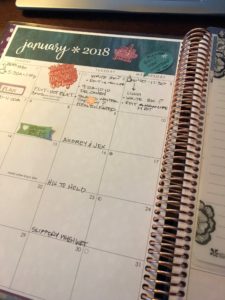 This past December my Deadwood Writers Voices editor, John McCarthy, asked us if we were thinking ahead into 2018 and would we like to share what was on our minds for our writer’s life. There was also a post by Robin Covington on her Facebook page asking if we could pick one word to carry us through the new year what would it be. My word was efficiency. To reach my goal, I’m combining the answers to both questions because I find that I need one to go with the other if I’m going to make any progress in my career.
This past December my Deadwood Writers Voices editor, John McCarthy, asked us if we were thinking ahead into 2018 and would we like to share what was on our minds for our writer’s life. There was also a post by Robin Covington on her Facebook page asking if we could pick one word to carry us through the new year what would it be. My word was efficiency. To reach my goal, I’m combining the answers to both questions because I find that I need one to go with the other if I’m going to make any progress in my career.
The answer to the first part is:
- Dive deep into A NEW LIFE, book 1 in my Leeti vampire series, and see what needs to be done so it’s ready to be published.
- Write on a schedule instead of when I feel like an idea is brewing.
- Market HOT BLACKTOP
- Continue to develop new stories in a loose format so when I’m ready I can start writing the novel.
To help with the points above, I asked the same person, Robin Covington, what she used as an organization tool. She had mentioned Erin Condren’s Life Planners. What’s great about them is that an individual can customize it for a particular use. Plus, bonus, the planners, are made in America. In my case, writing. Here’s the link https://www.erincondren.com/. What it’s going to help me do is narrow my focus on writing while the appointments and scheduling for my family are on the periphery of this schedule.
In my twenties, I used Franklin Covey’s planning system, but I don’t think that style works for what’s happening in my life. I need more visual space to plan my day to day tasks. And I don’t want it to be on the computer. I want to be able to spread it out, look at it, touch it, get a feel for what’s happening next. I won’t stop using my computer schedule because I love being able to get a notification telling me that I better get on my way to make my appointment on time. But having something that is not digital helps my creative side and allows me to get down on paper the ideas of the sexy heroes and heroines I’m writing into stories. And one thing I did learn from Franklin Covey was how to prioritize a full schedule and strive to reach my life goals.
For the first point, regarding A New Life re-reading and editing content, I also need to tackle the grammar errors for publication and make sure the storyline is consistent. With all the things listed above scheduling is essential. If I tell myself I’ll set aside some time for the next day, if I’m not being specific in my listed tasks it won’t get done. I’ll sit down and read or go shopping.
Writing on a schedule seems natural enough, the dates and times and all. It’s the other things that get in the way that hinder the process. So, scheduling the time to write is what’s got to happen. I’m used to free-writing on Tuesday’s. It’s my day off from making coffee and I have a significant amount of time. What should I do, I write it on the schedule. Appointment. Write on the schedule. Cello lessons for Kid #1. Write it on the schedule. My hope is, the time I set aside to write is productive. I still want to read as many romance novels as I can, but with my hours laid out, it will be easier to focus my ideas and get things done.
Marketing Hot Blacktop is something I’ve been doing throughout 2017, but I don’t think I’ve been as consistent as I can be. I could be using Facebook more efficiently plus all the other media platforms. I need to plan time to watch some tutorials. I need to link my Twitter, Pinterest, and Snapchat accounts to ramp up my marketing presence. Each one is part of my story, and I need to use them the best that I can. Here’s a helpful video I’ve watched regarding scheduling for a marketing focus by author Hildie McQueen.
And for the developing of stories, this planner system will allow me to add pics and fun notes about characters I’m developing, story ideas, arcs, and other tidbits. There are extra pages to use just for this purpose.
Now I have a plan. Here’s to being more efficient in 2018. Happy writing!

